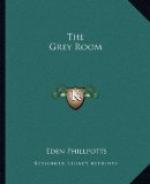“There was no blow, Henry,” said Sir Walter.
“Death is a blow, uncle—the most awful blow a strong man can be called to suffer, surely. And I beg this, that if you won’t let me face the infernal thing alone you’ll let me share this business with Mr. May. He can pray and I can—watch.”
But the dead man’s father made short work of Henry’s proposition.
“You are introducing that very element of rationalism to be, before all things, distrusted here. The mere introduction of human precaution and human weapons would sully faith and make of no avail the only sure means of winning light on this solemn problem. Reason, so employed, would be a hindrance—an actual danger. Only absolute faith can unravel the mystery before us.”
“Then, frankly, I tell you that I lack any such absolute faith,” declared Sir Walter.
“Do not say that—you libel yourself and are letting a base and material fear cloud your own trust,” answered May. “As there is no human reason for what has happened, so no human reason will be found to explain it. By denying me, you are denying the sole means by which this dark terror can be banished. You are denying God’s offer of peace. We must not only seek peace, but ensure it. That means that we are now called to take such steps as the Almighty puts at our service by the road of conscience and faith. I have a right to this revelation as my boy’s father. The cup is mine, and you will do very wrongly if you deny me the right to drink it. I desire to say, ‘Peace be to this house’ before I leave it, and, Christian to Christian, you cannot deny me, or hesitate as to your answer.”
No argument would bend his obstinate conviction, and he debated with great force from his own standpoint. He presented a man overmastered and mentally incapable of appreciating any argument against his possession.
But Sir Walter, now determined, was as obstinate as the clergyman. Mannering bluntly declared that it would be suicide on May’s part, and a conniving at the same by any who permitted him to attempt his vigil.
“I, too, must do my duty as I see it,” summed up the master of Chadlands, “and after I have done so, then we may be in a position to admit the case is altered.”
The other suddenly rose and lifted his hands. He was trembling with emotion.
“May my God give a sign, then!” he cried.
They were silent a moment, for courtesy or astonishment. Nothing happened, and presently Sir Walter spoke:
“You must bear with me. You are upset, and scarcely know the gravity of the things you say. To-morrow the physical and material investigation that I consider proper, and the world has a right to demand, will be made—in a spirit, I hope, as earnest and devout as your own. And if after that no shadow of explanation is forthcoming, and no peril to life can be discovered, then I should feel disposed to consider your views more seriously—with many reserves, however. At any rate, it will be your turn then, if you still adhere to your opinions; and I am sure all just persons who hear of your purpose would join their prayers with you.”




